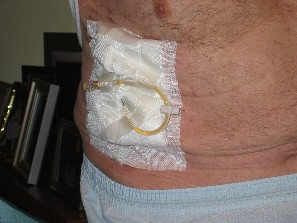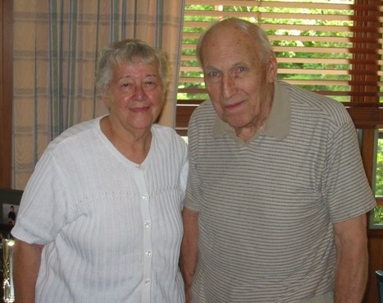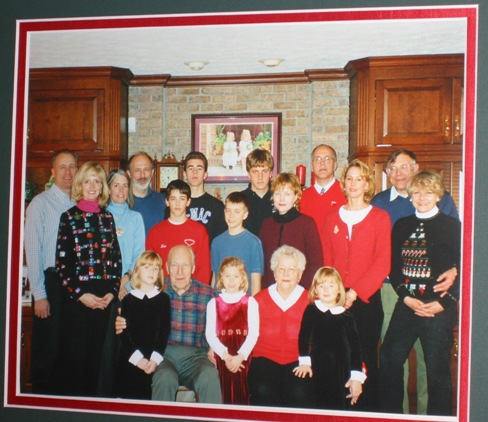Football Player Tackles Game Plan For Treating Mesothelioma
Joseph Brendel has lived the American Dream. He is an 83-year-old retired nuclear engineer who originally came from a 100-acre farm in St. Mary's, Pennsylvania. After attending Duquesne University for one semester on a football scholarship, Joe joined the Navy and was stationed in the South Pacific during the mid 1940s. When he returned home, he finished school while playing semi-professional football for the McKeesport Ironman team. In college he met the love of his life, Olga, who also served in the U.S. Marine Corps. They have been married for over 50 years and enjoy a full life with their four grown children and seven grandchildren.
Joe's retirement days were busily spent crafting furniture, helping his eldest son restore antique autos, and putting new additions onto his house. Joe also enjoyed visiting his extensive family and working around the house. In early May 2006, he began to notice some chest pain and experienced trouble breathing. He went to the Allegheny General Hospital in Pittsburgh, Pennsylvania where doctors took several chest films. Initially, they thought Joe had a heart problem, but later discovered he had a large right pleural effusion in addition to having a collapsed lung in the middle and lower right lobes.
On May 18, 2006, doctors at Allegheny General Hospital performed a thoracentesis to drain the fluid from Joe's chest cavity, discovering a bloody effusion. A few days later, he underwent a right thoracoscopy where doctors used a thin, tube-shaped instrument with a light and a lens to examine his chest. He also had a second thoracentesis and a pleural biopsy. To help drain any fluid accumulation, doctors inserted a tube in his side. The tumor encapsulated both the visceral and parietal pleura and the entire right lobe. There was suspicion that that the cancer had extended into the diaphragm. On May 23, Joe underwent a bronchoscopy.
The results of this battery of tests showed that Joe was suffering from pleural malignant mesothelioma. The cell type was identified as sarcomatous, which is a rare form of mesothelioma.
MAPPING OUT A GAME PLAN
On May 31, 2006 Joe met with oncologist Dr. Dulabh Monga. Dr. Monga believed that, due in part to his age, Joe was not a candidate for surgical intervention. Even though Dr. Monga thought the relative area of the chest cavity was too large for radiation therapy, she offered to set up an appointment with a radiation oncologist if the Brendels wanted to explore radiation therapy further.

When Joe expressed he was not interested in the possibility of radiation therapy, Dr. Monga suggested a chemotherapy combination of Alimta and Carboplatin. After discussing the issue, Joe elected to have chemotherapy. His first treatment was administered on June 7, 2006 at the Allegheny Hospital Cancer Center. Joe was scheduled for six treatments given approximately 21 days apart.
After his chemotherapy began, Joe lost his appetite and consequently some weight (about six pounds). He also began to feel weak and could not walk around his house for more than a limited amount of time. He had to remember to stand up slowly so that he wouldn't get dizzy, either.
Since the tube in his side was inserted in May, a nurse visits Joe at home to drain any fluid accumulation three to four times a week. The Brendels feel blessed by this service as the nurse also picks up medication for him and is an excellent caregiver. She is gentle, and Joe has no pain in his side from the tube.
With the help of his son, Neal, and Roger G. Worthington, Joe consulted with Dr. Robert Cameron on July 23, 2006. Dr. Cameron is the chief of thoracic surgery at the David Geffen School of Medicine at UCLA in Los Angeles, California. He is one of a handful of doctors who has significant experience treating mesothelioma patients, including those with sarcomatoid type mesothelioma.
Dr. Cameron advised Joe on a different route of chemotherapy treatment. Instead of administering Alimta and Carboplatin, Dr. Cameron suggested high dose Ifosfamide and Adriamycin if Joe was not having a response to the Alimta after two cycles. Dr. Cameron advised that not all oncologists make such a distinction between epitheliod and sarcomatoid mesothelioma patients, but Dr. Cameron has had some great success stories for sarcoma patients whose tumors have almost completely disappeared on this regimen.
However, Joe stayed on Dr. Monga's treatment plan and completed his chemotherapy treatment by early August. Films from a PET and CT scan look virtually the same as those taken on May 18, meaning that the chemotherapy had successfully "stabilized" the cancer. Additionally, certain lymph nodes in the hilum have increased in size. Dr. Monga plans to give Joe a break from his chemotherapy treatment for about one or two months before administering additional chemotherapy.
Both Dr. Monga and Dr. Cameron have been monitoring Joe's progress, and some of Dr. Cameron's suggestions are likely to be incorporated into the next round of treatment. Dr. Monga has also watched over the amount of fluid accumulation in Joe's chest while he is not taking chemotherapy. Joe's nurse continues to drain his fluid three times a week, but the accumulation does not appear to be problematic at the moment.
In mid-October, Joe returned to Dr. Monga's office where a PET scan revealed that he is "holding his own." His mesothelioma continues to be maintained and has not progressed. Joe will return to Dr. Monga's office in December 2006 to discuss further treatment but at the moment is not undergoing any chemotherapy.
Even with good reports from his doctors, Joe still tires easily and is fatigued. Olga remarks, "It is a day to day thing," and seems to remind herself "to count her blessings."
THE FAMILY RALLIES
For Labor Day, Joe's family visited and enjoyed a wonderful afternoon together, even though Joe moved slowly and tired easily. As a former professional athlete, he loves to watch his grandchildren's sporting events at every chance.
Over the past months, Olga has provided for Joe as best she can. She is grateful the mesothelioma is "static" for now, and recognizes how fortunate they have been over the past 58 years together. She said you "do the best you can under the circumstances." The family feels similarly, each of their children visits as often as possible. Two of their sons continue to actively research medical options and to correspond with Joe's doctors regularly to ensure he is receiving the best treatment possible.
This fall, Joe will miss "Grandparents' Day" at his grandsons' school for the first time. He is upset by this, but he doesn't have enough energy to go. Olga will go by herself. The grandchildren had hoped they would both be able to make it. Yet, they do plan to keep their Thanksgiving tradition. Thanksgiving is a favorite holiday for the Brendels and Joe has specifically requested dinner be served at their house. He looks forward to having his children and grandchildren under one roof for a time of thanks.
Olga gives thanks every day. She continues to arm herself with knowledge, actively seeking out what research is being done. With the help of her daughter, Olga navigates the internet looking for the latest information. She is glad that research is being done although she acknowledges that it doesn't seem to be enough. She is also grateful for the help she has gotten at every turn, from the home care nurse who takes away much of the unnecessary worry of medical appointments and treatment to Roger G. Worthington, P.C. who has provided them with the "best attorneys." Olga is such a positive person and always focuses on the good that others are doing, that's why it has been so difficult for her to understand why something like this could happen to the love of her life.
*** POSTED NOVEMBER 2, 2006 ***
Mr. Joseph Brendel passed away on November 25, 2006



